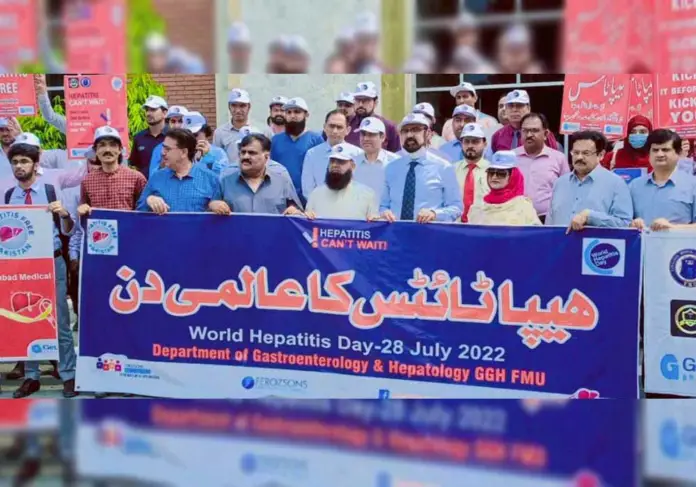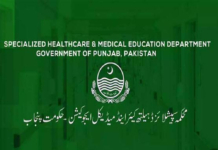On the occasion of World Hepatitis Day, an awareness walk was organized by the department of internal medicine at Faisalabad Medical University, which was led by Vice-Chancellor Prof. Dr. Zafar Chaudhry.
The walk started at Punjab Medical College and ended at Allied Hospital. A large number of medical staff, including Prof Dr. Amir Shaukat, Dr. Mughees Athar, and Dr. Muhammad Irfan of the department of medicine participated.
Speaking at the end of the walk, the Faisalabad Medical University vice-chancellor said that citizens should get blood from recognized and reliable blood banks. “Never pick a used syringe, never get a tattoo on any part of the body, and, lastly, surgical instruments must be sterilized. It should also be ensured that the barber uses a new blade every time to shave the hair,” he stressed.
Dr. Muhammad Irfan said that 20 per cent of people in the Faisalabad district were suffering from this disease. “The rate of hepatitis C patients in the country was 8 per cent, while that of hepatitis B patients was 3 per cent. A total of 80% of people do not know that they were suffering from this disease,” he added.
Hepatitis is a silent killer, so awareness is crucial to prevent this disease, he said, adding that if not treated in time, liver cirrhosis and liver cancer can develop.
Dr. Irfan said that one person is dying every 30 seconds due to a hepatitis-related disease. “We cannot wait to control viral hepatitis; the country still faces many challenges in its response to this disease,” he maintained. After China, he said, Pakistan has the highest number of hepatitis C infected people at 8 per cent. “We need to vaccinate children against hepatitis B, prevent mother-to-child transmission of hepatitis B virus, and ensure safety in blood and injection,” he stressed.
Professor Dr. Aamir Shaukat, while appreciating the political commitment of the government and the cooperation of the provincial health department, said that people in the country were getting affected by the virus of viral hepatitis. Unsafe injections are a common source of hepatitis B and C virus infection and other blood-borne diseases such as HIV, he added.
At the same time, awareness of hepatitis B birth dose vaccination was still low and far from achieving the desired goal, he said.
In a message regarding World Hepatitis Day, World Health Organization (WHO) representative Dr. Palitha Mahipala said that the global health body was waiting for the day when viral hepatitis will be eradicated.







